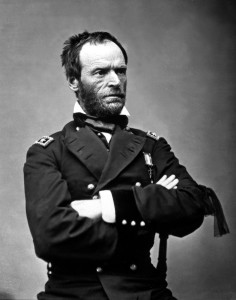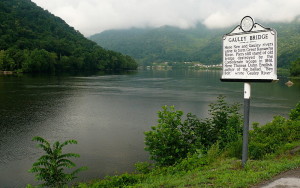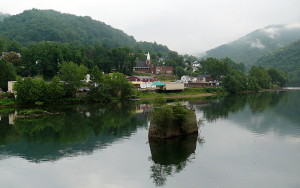It had been real quiet for the New York First Veteran Cavalry in the Kanawha Valley, but our SENECA correspondent was able to report the April surrender of a small rebel force at Lewisburg on Appomattox terms. The veterans in the Veteran cavalry weren’t sure when they could come home but were going to make the best of the wait with strawberries and ice cream.
From a Seneca County, New York newspaper in 1865:
From the First Veteran Cavalry.
KANAWHA VALLEY, W.VA.,
May 15, 1865.
FRIEND STOWELL: – The great events which have been crowded into the past few weeks, the glorious victories of Grant and Sheridan, the triumphant entry into Richmond, the surrender of Lee, the wonderful achievements of Sherman and the atrocious murder of our President and Commander-in-Chief have so filled and excited the public mind that accounts from a single regiment attract but little attention. Yet there may be some who still feel an interest in the veterans, and for their gratification I will give you a few items.
During the last three months everything has been remarkably quiet in the “District of Kanawha.” Now and then a flag of truce has come down from Gauley. Here and there a little scout of fifty or sixty miles, and that is about all that has occurred to relieve the tedium of camp life, and remind us that we really are in the field.
While upon one of these scouts, however, soon after the news of Lee’s surrender had been received, your correspondent had the honor of meeting Col. Hounshell the commandant of the Rebel Port of Lewisburg who had come down to make terms for his command, and if possible for the numerous independent or Guerrilla bands that have operated in this part of the country. Information was immediately sent to Department Head Quarters, instruction received, and negotiations opened at Gauley Bridge, the result of which was that Col. H. surrendered his entire command upon the terms granted by Grant to Lee and a party was soon sent to Lewisburg to receive the arms and to grant the necessary paroles. Over fifteen hundred men have already been paroled including several Colonels, Majors, and any number of Line Officers. Quiet and order are restored to this section of the country and citizens are rapidly resuming their accustomed avocations. We carried with us to Lewisburg the mournful intelligence of the infamous murder of our President and the dastardly attempt upon the life of Secretary Seward. The citizens of Lewisburg with officers and men of the Confederate army were earnest in their expressions of deep regret at these wicked crimes, and seemed to feel that they had lost a friend. The kind and generous policy which Mr. LINCOLN had adopted, had endeared him to all, and many have learned his worth only too late. It is to be hoped that President Johnson will pursue the same course marked out by our late President and soon restore peace and quiet to our distracted country.

loved and venerated (said to be an 1865 photo of General Sherman wearing a mourning ribbon for Abraham Lincoln)
What a tremendous furore has been raised against the gallant SHERMAN by the rabid papers and fanatics of the north. – Set on by such men as Halleck, they seem to ignore entirely all the wonderful achievements and mighty victories of that great commander, and because he differs with them in politics, or has in their profound judgment, committed a single error, they denounce him in the most bitter terms and seem bent upon his utter ruin. It is some satisfaction to know that the more respectable portion of the Republican Press still support and defend this gallant man who has done so much to bring the war to a close, but it is more to know that all the execrations of these fanatical cowards are in vain and that to-day General Sherman stands among the first in the love and veneration of the American people.
Whether our regiment is soon to come north or not, of course no one knows. We did expect a speedy return to our homes but an order has just been received to muster out immediately all whose term of service expires before October 1st, 1865, so we infer that the veterans are to be retained a while longer. By this arrangement we lose a little over three hundred in all – Company K. about twenty – Recruits who joined us last fall. This will reduce the regiment to less than eight hundred men, and of course several officers will have an opportunity to go home.
A Board of examiners is now in session at Charleston, of which Lieut. Lightburn is President and perhaps this may have something to do in deciding who are to remain.
Rev. Father McKerwan of Mason city visited the various camps of our regiment a few days ago, and celebrated Mass at Camp Piott [Piatt], Loup Creek and Gauley Bridge. Large numbers of the soldiers attended the solemn services of the church, and many a one was carried nearer home than he had been before for many a day.
Mr. R.F. Taylor, a citizen of Rochester, N.Y., was here not long since and conducted himself in a very ungentlemanly and disgraceful manner. He attacked without provocation, our commanding officer (Col. Platner) and abused him in a most outrageous way. Mr. Taylor has merited and fully possesses, I assure you, the utter contempt of every officer in the regiment, and it is a wonder to all that Col. Platner has treated him with such great forbearance and leniency – But more of this anon.
The weather is getting to be extremely warm in the Valley, the thermometer nearly reaches a hundred already. Vegetables of all kinds are in perfection and it really appears like summer. Roses are in full bloom, soda fountains in full blast and before this reaches you strawberries and Ice cream will be all the rage. So you can easily imagine what we are at just now.
Yours ever, SENECA.
The photo of the town of Gauley Bridge by Ken Thomas looks “across the Gauley River at the town of Gauley Bridge. The pilings in the foreground are the remains of the Civil War-era covered bridge that gave the town its name. The original bridge was destroyed by retreating Confederate troops in 1861.”
Robert F. Taylor led the 33rd New York Volunteers for its entire two year term. In the latter half of 1863 he organized the First Veteran Cavalry but was dismissed from the service in 1864.
Lest I forget, SENECA might have had a bit of a wait, as the New York State Military Museum points out:
Commanded by Col. John S. Platner, the regiment was honorably discharged and mustered out, July 20, 1865, at Camp Piatt, W. Va., having, during its service, lost by death killed in action, 4 officers, 32 enlisted men; of wounds received in action, 15 enlisted men; of disease and other causes, 87 enlisted men; total, 4 officers, 134 enlisted men; aggregate, 138; of whom 32 enlisted men died in the hands of the enemy.


